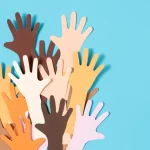On a hot afternoon in March 2011, I wrapped up my routine lectures at college and proceeded to take my usual route back home. To fetch an auto rickshaw that would ferry me to my destination, I had to cross over to the other side of the city using an old railway bridge. The heat was unrelenting. As I walked by, I came across a festively dressed group, huddled in one corner of the bridge.
At first, nothing seemed odd about that cheerful gathering. But something had caught my eye. Draped in a beautiful red saree, clinking green bangles, henna-tattooed hands and ornaments intertwined with a flower garland dangling from her delicate neck was a little girl, barely twelve, plonked on a suitcase; all tell-tale signs of a bride—a child bride!
A flurry of thoughts raced through my head. It’s child marriage! Are they her real family? What could I do? What should I do? Sadly, I ended up doing nothing, and, just like any other passer-by, I pitied the child and walked away with a heavy heart. As the day progressed and turned to night, she continued to linger in my mind and I prayed for her safety. When I couldn’t hold it in any longer, I confided in my husband about the events that had transpired that day, constantly thinking: “If only I could do something”.
My husband took a deep breath and in his calm casual manner remarked, “If you could not, how do you expect others to?” That moment was a turning point for me. Sometimes we don’t get a second chance. We cross paths with our purpose. I did not help the little girl at the train station, but she got me thinking and pushed me out of my comfort zone to study about the issue of violence and abuse.
In 2014, God opened doors to work with an anti-human trafficking organisation, the largest anti-slavery organisation in the world. It was then that I learnt how widespread and real the problem of violence, slavery and injustice is. The Global Slavery Index (2018) estimated that roughly 40.3 million people are currently under the yoke of modern-day slavery. India alone accounts for around 8 million slaves that includes children sold in brothels, given for child marriage, trapped as bonded labour, being traded to various small-scale industries and more.
…I had little understanding of the issues of violence, injustice and slavery. I had never seen these issues as churches’ concern or a believer’s problem.
Though growing up in a godly family and church, I had little understanding of the issues of violence, injustice and slavery. I had never seen these issues as churches’ concern or a believer’s problem. I never understood until I saw it with my own eyes. Every rescue operation shows me how real the darkness is. How desperate the need is for those who are in the light to make efforts to enter the dark places and reach out the unreached. My work opened my eyes to what oppression looked like in scriptures and felt like in today’s context. I have seen the innocent being abused in brothels, in the hands of abusers within families, in broken public justice system, in crowded court rooms, in communities. I saw the tears of the oppressed and they had no comforter; power was on the side of their oppressors and they had no comforter.
The need to stand up for the oppressed is not new, it has been recorded for centuries (Ecclesiastes 4:1). As in the times of Amos, even today we are so busy clinging to our routine that we have missed love and compassion that marks us as people of God. Amos chastens God’s people saying, ‘let justice roll down like rivers, and righteousness like an ever-flowing stream’ (Amos 5:24). The call hasn’t changed today, we are to defend the weak and the fatherless; uphold the cause of the poor and the oppressed (Ps 82:3). The best part is that it is God’s mission and we are his plan (Mat 5:13–16). God has placed each one of us in places he wants us to be the salt and light. God’s heart for justice and passion for brokenness in the world is to reach out through me and you as the body of Christ.
Churches can take initiatives in creating community centres and legal aid clinics for the survivors [of abuse, violence] enabling them to find legal help and support on day-to-day basis.
Justice is the principle that people receive that which they deserve, such as freedom, dignity, love, equality and right to live. Abuse, violence and injustice in any form deprives every oppressed from their basic human rights that they deserve.
For centuries many individuals and churches have bridged the gap by addressing various social needs concerning education, poverty, medicines and more. But considering the overwhelming number of people trapped in modern-day slavery, there is a great need for individuals and churches in today’s time to be vigilant in reporting crime and taking active part in the restoration and rehabilitation.
Through the willingness of a few faithful churches that have volunteered to stand in the gap we have witnessed a great impact. Churches can become a part of eradicating this slavery by being aware of the grave reality that surrounds them. Freedom Sunday was one such effort made to raise awareness about the issue of slavery among churches across the globe. Churches can partner with the organisations working towards the cause by contributing their time and talents. Churches can sponsor survivors’ educational needs equipping them to get into mainstream society. Churches can partner in interceding for the frontline workers and the victims to be rescued and restored. Churches can create a strong support system for the survivors helping them integrate back to the society by helping them restore dignity and empowering them with various life skill training and livelihood programmes independently or can support the existing programmes in various government shelter homes or private aftercare homes were the survivors are placed for their safety. Churches can play a vital role in supporting government mechanisms like shelter homes, child welfare committees, police stations, courts, livelihood centres by supporting their infrastructural needs or any other systemic needs in various capacities to strengthen the public justice system. Churches can take initiatives in creating community centres and legal aid clinics for the survivors enabling them to find legal help and support on day-to-day basis. Church volunteers can express their love by celebrating important days and events with the survivors by visiting them at the shelter homes. Involvement of church in the work of justice revitalises every individual in the church as we get to experience God’s heart at a deeper level. Let’s not fail to understand the need is great but the one who has called each one of us to work in His vineyard as an individual and as church is far greater. Let’s step up and offer to be the light for God to make a bonfire amid darkness!






